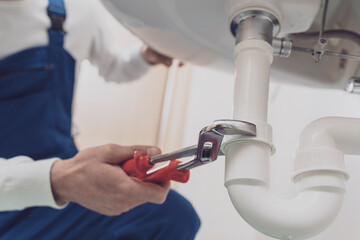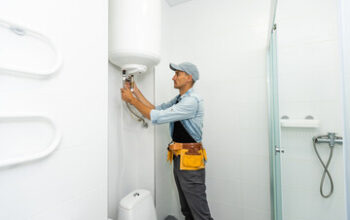Plumbers install and repair water, gas, and waste piping systems. Plumbers Bradenton FL also install sinks, toilets, and faucets in homes and businesses. They follow blueprints and building codes when laying out piping and installing fixtures.

People who become plumbers enjoy on-the-job variety and travel. They also like working with their hands and mind. If you’re considering this career, take our free career test to see if it matches your personality.
Installation
Plumbers install pipes that supply water and gas to, as well as carry waste away from, homes and businesses. They use their knowledge of building codes and blueprints to properly place and connect the various components. Plumbers also have the skills to repair existing pipes and fixtures, including bathtubs, sinks, toilets, showers, and appliances like dishwashers and water heaters.
Plumbing systems can get clogged with debris and other materials, so plumbers often use tools to unclog drains and pipes. These tools include augers, snakes, and hydro jets. They can also replace old, damaged, or worn-out pipes and fixtures. Some plumbers specialize in specific types of plumbing systems, such as sewage or drainage systems.
A plumber’s daily duties and responsibilities also include responding to emergency calls from customers. They must be able to troubleshoot issues and make repairs as needed, whether it’s a burst pipe or a toilet that won’t flush. They also need to keep up with the latest plumbing technologies and equipment.
Plumbers usually need to have a high school diploma or equivalent and complete an apprenticeship program. These programs last four to five years and combine classroom instruction with paid on-the-job training. Apprentices must pass an exam to become a journeyman plumber, which qualifies them to work independently. Plumbers must also obtain a license to practice in their field.
Some plumbers may choose to join a labor union, which can help them find jobs and improve their pay rates. They can also increase their chances of finding employment by taking continuing education courses.
The workplace environment for plumbers varies depending on the type of plumbing they do. Commercial and industrial settings tend to have more complex plumbing systems than residential ones. In these settings, plumbers may need to collaborate with other professionals, such as construction teams and architects, to ensure that plumbing systems are integrated seamlessly into a building project and meet all necessary regulations and standards. They may also be responsible for overseeing the work of apprentices and other plumbing staff. In some cases, they may be required to travel to different job sites.
Repair
Plumbers repair and maintain water and sewage systems in homes and businesses. They inspect pipes, repair leaks, and install fixtures such as sinks, bathtubs, toilets, and showers. Plumbers also repair and maintain backflow prevention devices, garbage disposals, and water heaters. Some plumbers specialize in plumbing for commercial buildings. They may perform more extensive repairs and installations in these environments, including repiping and sewer line replacements.
Plumbers need a wide variety of tools and equipment to complete their work. They use hand tools for small jobs and power tools for more complicated tasks. Many plumbers also use specialty tools to unclog drains or inspect sewer lines. Some examples of speciality tools include pipe cutters, snakes, and drain augers. Plumbers must also have good manual dexterity to operate these tools and to maneuver in tight spaces.
In addition to these physical skills, plumbers need strong problem-solving abilities. They must be able to identify the source of a problem and recommend the best course of action for fixing it. They also need to have excellent communication skills to discuss the issue with customers and explain their options.
Plumbing problems can be extremely dangerous if not addressed quickly. For example, a leaky pipe can lead to flooding and water damage in your home. Backed-up sewer lines can cause a lot of mess and even render your toilet useless. Plumbers can fix these issues before they worsen and prevent further damage to your home.
As a result, plumbers often work long hours and are on-call for emergency situations. This makes it important for plumbers to have a flexible schedule and the stamina to perform physically demanding labor. Plumbers must also be comfortable working in confined spaces and with ladders and other climbing equipment. They must also be able to read blueprints and understand the basics of construction and plumbing math. Finally, they must be able to work independently or with others in a team. To ensure the safety of themselves and their customers, plumbers should follow all local and state regulations regarding workplace safety. For example, they should always wear protective gear when handling hazardous materials or working in confined spaces. They should also keep cutting equipment away from their face and body to avoid cuts or puncture wounds. They should also dispose of oily rags and other waste materials properly.
Maintenance
Plumbers install, repair and maintain the pipes, fixtures and appliances that facilitate the distribution of water, gas and waste in residential and commercial settings. Their work ensures that a building has clean water for drinking and cooking, that gas systems operate safely and that waste is removed effectively from the structure. Plumbers typically receive their training through an apprenticeship, which combines classroom instruction with paid on-the-job training. After completing an apprenticeship, most states require plumbers to obtain a license before working independently.
Plumbing maintenance services include repairing leaks, unclogging drains and toilets, and installing new fixtures and appliances. Plumbers also inspect plumbing systems to identify and correct issues such as corrosion, sediment build-up and drainage problems. They use tools such as augers, snakes and hydro jets to clear obstructions from pipes and drains. In some cases, they may need to dig up and replace entire sections of pipe.
Most people don’t give much thought to their plumbing until something goes wrong, such as a clogged toilet or a shower that won’t get hot. That’s when they turn to a plumber for help, and it’s important for them to find one that they trust. Plumbers can be found in a variety of places, including online directories and classified ads. Some even have their own websites where they list their services and provide contact information.
Some plumbers specialize in particular types of maintenance and repairs. For example, some only do service calls, which involve fixing existing plumbing rather than installing new parts. These plumbers are usually licensed and have the necessary skills to diagnose and fix a wide range of problems. Other plumbers may focus on installation, which requires them to have extensive knowledge of plumbing codes and regulations. They may also be responsible for obtaining permits and inspections for plumbing projects.
In addition to technical skills, plumbers need to have good customer service skills in order to keep customers happy and informed. They must be able to listen to customers’ concerns and explain complex plumbing procedures in an understandable manner. They should also be able to make recommendations on ways to improve a customer’s plumbing system.
Customer Service
As a plumber, you can provide your clients with a variety of customer service services. One of the most important is addressing customers’ concerns about their plumbing problems and answering questions. Providing a first-rate customer experience helps you establish yourself as a trustworthy business and a trusted partner.
Moreover, plumbers can help their clients prevent water damage by fixing leaks and clogs in toilets and sinks. This can save businesses money in the long run and ensures that operations continue smoothly. Plumbers can also offer services to fix boilers, sewer lines, and water heaters. This can help businesses reduce costs and minimize the risk of fires and flooding.
Plumbers can also help homeowners find solutions for their plumbing issues by educating them about the cause of the problem and the possible solutions. They can also advise on how to avoid costly repairs in the future by performing routine maintenance and cleaning. Additionally, they can recommend a reputable HVAC technician to handle any heating and cooling issues.
Another way that plumbers can improve their customer experience is by implementing customer referral programs. This can encourage current customers to refer your business to their friends and family, which can lead to more sales. You can ask for referrals in person when the job is done, in a follow-up email, or by adding a line to the invoices you send your clients.
Moreover, a plumber can improve their client relationships by using software that allows them to track client information, history, and interactions. This can help them respond to requests faster and provide a personalized service. Additionally, the software can automate roster notifications, mobile leave requests, and geo-fencing to optimize time and resource management.
In addition to these customer service services, plumbers can boost their reputation by connecting with local communities through social media and online forums. They can post photos of their work and share helpful tips to educate their audience. They can also connect with community organizations and homeowner associations to promote their business. Lastly, plumbers can use an answering service like Front Office Solutions to provide local phone numbers for their customers.



